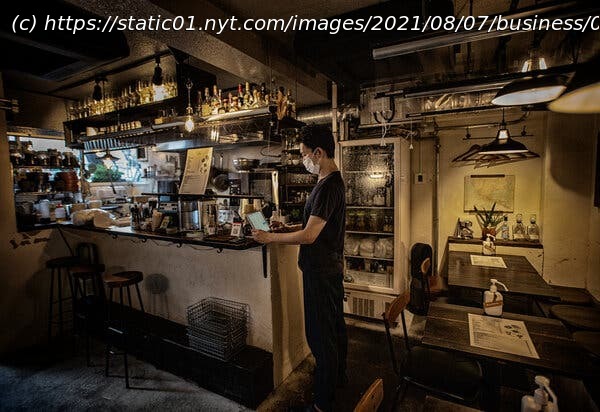The Games failed to live up to their economic promise and cast a harsh light on Japan’s political culture. Some feel “a hunger for a new system.”
Tokyo’s leaders promised glory and riches when the Japanese capital won its bid to host the 2020 Summer Olympics. Jobs and the economy would grow. The public would rally in support. Japan’s international stature would rise. The Olympics are set to close on Sunday, a year later than planned and far off the script the organizers described when they won the Games in 2013. The coronavirus forced the organizers to put the Games inside an anti-coronavirus bubble, all but eliminating any economic or even spiritual upside for Tokyo. Instead, the city has been reduced to a mere vessel for a mega-event that has demanded much but provided little in return. Even after spending many billions of dollars, Tokyo experienced the Games much like any other city: as an event on television. Makoto Inoue borrowed heavily to open a Mexican restaurant in 2018 in the shadow of Tokyo’s new Olympic Stadium, hoping that the location would attract Olympic visitors plus crowds of tourists for years to come. On the afternoon before the Olympics kicked off, customers piled into his small basement shop for one of the first times since the pandemic began. But at 8 p.m., coronavirus restrictions forced him to close his doors just as the opening ceremony was getting underway. “I could see the fireworks,” said Mr. Inoue,43. Instead of an economic boost, the Olympics brought a growing sense of malaise. Already weighed down by scandal and billions of dollars in cost overruns, the Games went ahead against the wishes of most of Japan’s people, who viewed them as an unacceptable risk to public health. The organizers’ insistence on holding them reinforced a sense that the country’s leaders are unaccountable to the public. After enduring so much, many in Japan have been left wondering what the point of it all was. “National confidence is in a fragile state,” said Nobuko Kobayashi, a partner in Tokyo with the Japanese arm of the consulting firm Ernst & Young, who regularly writes about social issues in the country. The chaos surrounding the Games has reinforced “a hunger for a new system and a new way of doing things,” she said. Poor decisions and missteps led to a series of resignations among top Games officials. Japan is now confronting its worst coronavirus outbreak yet, as some people in Japan appear to have taken the Games as a license to lower their guard. Voters may punish Japan’s leaders for their persistence. The party of Yoshihide Suga, Japan’s increasingly unpopular prime minister, is likely to retain power in the face of weak opposition in parliamentary elections that are set to take place no later than the end of October. Still, its grip could be considerably weakened, and Mr. Suga’s fate after that is an open question.






